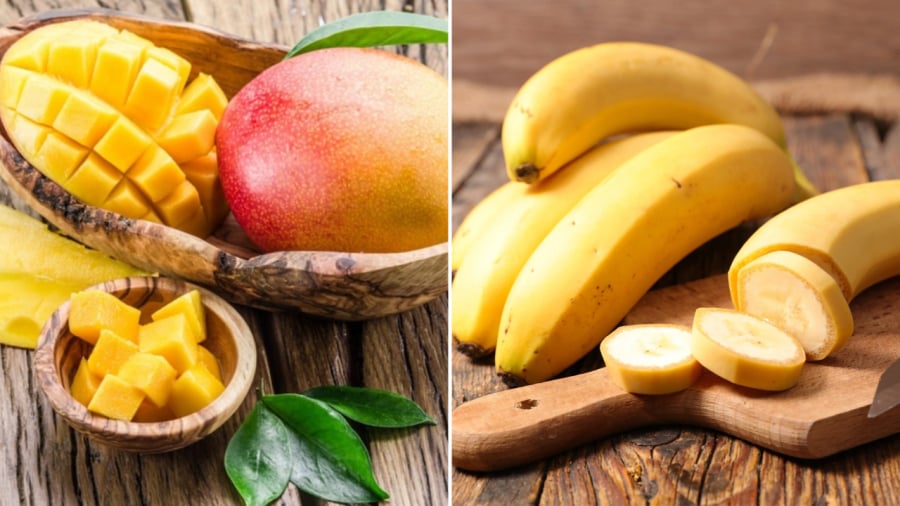Fruits are a great source of vitamins and minerals, but they also contain natural sugars. While these fruits are packed with fructose, which doesn’t spike blood sugar levels like glucose, consuming too much can still lead to weight gain and obesity. Eating large amounts of ripe, sweet fruit means consuming a significant amount of sugar. As a result, you may find yourself gaining weight, even if you’re skipping rice and eating only fruit.
Here is a list of fruits high in sugar that should be consumed in moderation to avoid weight gain.
Mango
Mangoes are tropical fruits with a delicious flavor that many people enjoy. You can eat mangoes fresh or use them in smoothies, ice cream, mango sticky rice, or mango desserts. They are a good source of fiber, vitamin A, and vitamin C, which aid digestion, boost immunity, and improve vision. However, mangoes contain a significant amount of natural sugar, contributing to a large portion of the calories consumed. Eating too many ripe mangoes can lead to rapid weight gain, especially when combined with other sugary dairy products like mango yogurt or mango ice cream.
Banana
Bananas are nutritious and energy-dense fruits, containing high levels of carbohydrates. However, a medium-sized banana (around 100 grams) typically contains about 12-14 grams of sugar, and the riper the banana, the higher the sugar content. This amount of sugar can contribute to weight gain if consumed in large quantities or regularly. To get the nutritional benefits of bananas without the weight gain, it’s advisable to control your portion sizes. Try eating half a banana or one small banana per serving, and avoid eating too many in a day. You can also pair bananas with low-calorie foods like plain yogurt or a handful of nuts.

Durian
Durian is a unique fruit known for its strong aroma and distinct flavor. Dubbed the “king of fruits,” durian has a high sugar content. Due to its distinct taste, durian may not be everyone’s favorite, but those who acquire a taste for it often become enamored with its creamy texture and rich flavor. However, it’s important to note that this fruit is high in sugar and calories. One hundred grams of durian provides approximately 147 calories, which is more than a bowl of rice. Overeating durian can cause a rapid increase in blood sugar levels and contribute to weight gain.
Jackfruit
Jackfruit is another tropical fruit with a delightful flavor that has gained popularity. It is an excellent source of vitamin C and provides various other vitamins and minerals. However, jackfruit is high in sugar and calories. Consuming too much jackfruit can result in excess calorie intake, leading to weight gain and obesity.

Pineapple
Pineapple is rich in vitamin C and has anti-inflammatory properties. However, it’s important to note that ripe pineapples contain significant amounts of sugar, which can cause a rapid increase in blood sugar levels after consumption. Eating large quantities of pineapple or drinking pineapple juice can contribute to weight gain. When pineapple is juiced, the fiber is removed, causing the body to absorb the sugar more quickly and potentially leading to increased hunger. To control your sugar intake, it’s advisable to eat whole pineapple in moderation. To avoid the tongue-tingling sensation that pineapple sometimes causes, soak the fruit in salted water before consuming it.
While fruit is undoubtedly beneficial to one’s health, it’s important to remember that it can contain more sugar than your body needs. Overconsuming fruit or using it as a replacement for other food groups like rice, meat, fish, or vegetables is a mistake. Such an imbalanced diet will make weight management challenging.



































